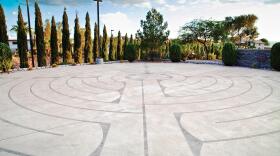Dr. Antonio Serru’s office is nestled in a modest medical district on Eastern Avenue just south of Flamingo Road. Appearances aside, though, there’s a particularly interesting story behind the unassuming building. Like many Las Vegans, Dr. Serru came from elsewhere. In his case, that elsewhere was 90 miles from the United States and yet worlds away: He was a refugee who fled Cuba 17 years ago with his wife and two sons. “The main reason I left Cuba was because of the poor economic conditions,” Serru says, his Cuban accent still noticeable. “The doctors are really paid nothing. I mean, I was paid $25 a month. I was actually seeing people that didn’t really study, people that really didn’t sacrifice as much as I did, getting rewarded more than I was. It was really unfair.” Once he settled in Las Vegas, he received assistance from Catholic Charities of Southern Nevada, beginning a relationship that continues to this day.
Every day, travelers arrive in Las Vegas from across the globe, but many are here for more than a vacation. They’re refugees seeking a better life. About 1,800 of them a year arrive in Las Vegas through Catholic Charities of Southern Nevada’s Migration and Refugee Services.
“The goal of our program is to help refugees become self-sufficient as quickly as possible,” says Whitney Eich, assistant director for the program. About 70 percent of Catholic Charities’ refugee clients come from Cuba. The rest flee Afghanistan, Burma, Eritrea, Iran, Iraq and Somalia, among other nations. They often spend several years, stateless in a refugee camp, waiting to be approved by the United Nations for “third country” resettlement, often in a place where friends and relatives can receive them. Not surprisingly, that third country is often the U.S. “Chances of being resettled to a third country are less than 1 percent,” says Eich. “Many of our clients describe it as winning the lottery. You might be living in a camp for five years, 10 years, just waiting for your name to appear one day on a list and find out that you have the chance to go to a new country.”
Serru was one the lucky ones who won that lottery. After settling in the United States, he was eventually hired by a Cuban doctor. When that doctor retired five years later, Serru bought both the practice and the building that now houses Serru Medical Center. He’s since added a medical spa that offers aesthetic treatments (fat reductions, facials), but the core of his services center on traditional medicine — while serving a community that’s very special to him. He says half of his patients are Cuban; another third are Spanish-speaking or refugees from places where Cuban doctors are held in high esteem. In fact, he makes sure they know he is Cuban and was once a refugee himself.
“I want them to feel like I am also a foreign person too,” he says. “I tell them, ‘I came the same as you. I didn’t drop in a helicopter here being a doctor and having all this. I came here and started working, getting $8 an hour too,’ to set an example. They come depressed. They come sad at their situation. They don’t have a job. I tell them ‘Look, I came the same and look at me. You can do it. Everyone goes through this. I lived in an apartment at Charleston and Maryland where there was drugs, where there was shooting everywhere. All that you’re doing I went through, and look at me.’ I try to show them that they can make it because it’s really frustrating at the beginning when you come. It’s scary, it’s scary.”









